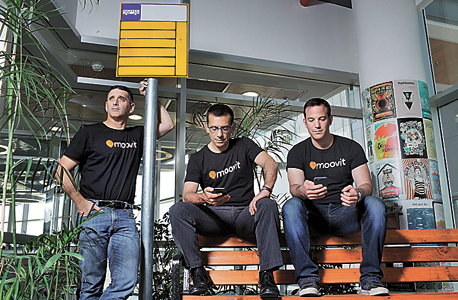CTech’s Weekly Israeli Tech News Roundup
Intel plans to expand chip manufacturing in Israel with $5 billion investment. Latest venture by Mobileye founders valued at $1 billion. Intel leads $50 million investment in public transit app Moovit.
14:5723.02.18
Intel plans to expand chip manufacturing in Israel with $5 billion investment. Intel is planning to purchase new machines for its 10-nanometer production lines, build new clean rooms, and hire hundreds of new employees for one of its Israeli chip fabrication plants in Israel. The new expansion comes on the heels of a previous $6 billion production expansion project at the same facility. Read more
 Moovit co-founders Roy Bick, Yaron Evron and Nir Erez (left). Photo: Amit Sha'al
Moovit co-founders Roy Bick, Yaron Evron and Nir Erez (left). Photo: Amit Sha'al
Latest venture by Mobileye founders valued at $1 billion. Artificial vision device company OrCam Technologies Ltd. completed a funding round according to a company valuation of $1 billion, two people related to two of the investors said, speaking to Calcalist on conditions of anonymity. Read more
 Moovit co-founders Roy Bick, Yaron Evron and Nir Erez (left). Photo: Amit Sha'al
Moovit co-founders Roy Bick, Yaron Evron and Nir Erez (left). Photo: Amit Sha'al
New York to host Israeli tech conference. Calcalist will host its Mind the Tech conference in New York for the second time on March 12-14. Held in collaboration with Israel’s Bank Leumi, the event will feature leaders of industry and government, including former U.S. Senator Joe Lieberman and former Central Intelligence Agency Director James Woolsey. The conference will also host a startup competition by Israel-based venture capital firm Jerusalem Venture Partners. Read more
Intel leads $50 million investment in public transit app Moovit. The free app offers real-time public transit information to a global user base of over 120 million people in 2,000 cities and 80 countries. Possible collaborations between Moovit and Intel's Mobileye in the field of autonomous vehicles are being examined. Read more
Despite hype, Chinese investors still minor players in Israeli tech, report says. Data from past four years shows Chinese investors tend to seek out strategic tech potential rather than immediate financial performance. Read more
10 Israeli startups founded by ultra-orthodox Jews are seeking New York investors. The ultra-orthodox population has mostly been left out of the country's technology boom, partially due to a focus on religious studies among many ultra-orthodox men and partially due to a culture of network-based recruitment processes that favor those who served in elite units of the Israeli military. Most ultra-orthodox Israelis forgo military service. Read more
Government innovation investment arm marks next frontiers for Israeli tech: quantum computing, personalized health, and precision agriculture. Israel’s influential innovation authority intends to invest in domains that may bring about the next spurt of growth for Israeli tech, said CEO Aharon Aharon. A former Apple executive, Mr. Aharon noted that in the past the state invested much funding in cybersecurity startups, correctly assessing the potential of the domain, but also sunk money into nano-technology, an action that resulted in limited economic growth. Read more
The Israeli cannabis technology industry: 68 companies, 900 people, $76 million raised. Activity in the segment has been on the rise in Israel since 2013, according to a new report. Read more
Teva turns to meritocracy as part of turnaround plan. After canceling its annual bonuses for 2017, Teva Pharmaceutical Industries Ltd. is rolling out a new bonus plan for 2018—one that is based on both personal and company performance. Read more
With top executives in custody, Israel’s biggest telecom left in management void. With its CEO, chairman and owner, one board member and one senior executive detained by Israeli police since Sunday, Bezeq has been left to the management of a relatively new acting chairman and to second-row executives. The company’s acting chairman is currently on vacation out of the country. Read more



